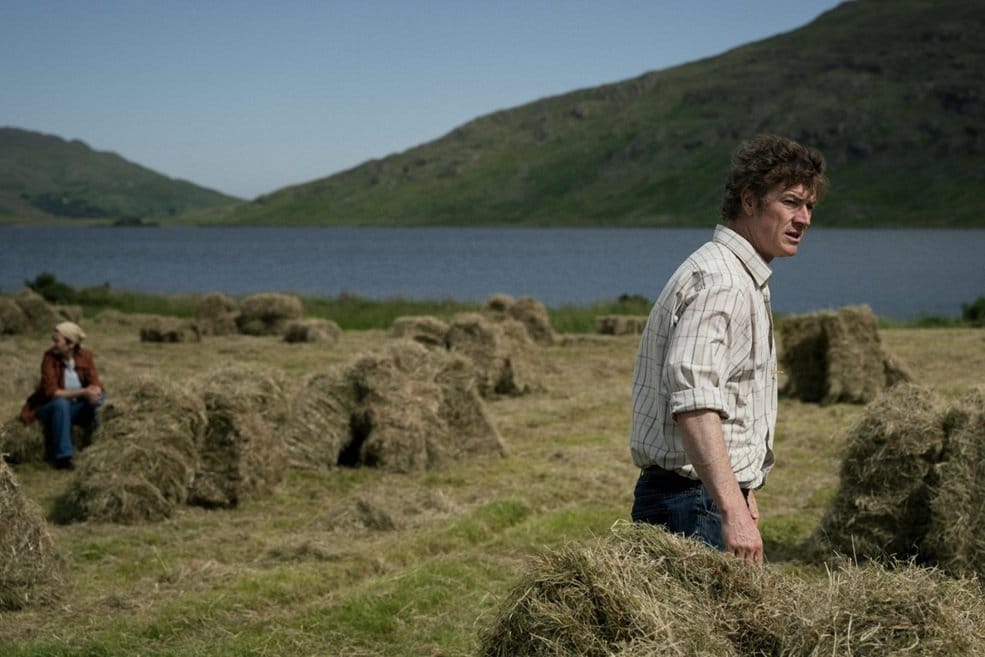There is a kind of stillness to life in a small Irish village, the kind that settles into the bones and becomes part of the air. The lake ripples softly in the morning light, the wind hums through the trees, and time moves at its own patient rhythm, unhurried and unbothered by the modern world. In That They May Face the Rising Sun, director Pat Collins captures this rhythm with a quiet reverence, crafting a film that does not hurry toward resolution, does not demand attention with grand declarations, but rather lingers in the moments between words, in the soft edges of ordinary life.
Joe (Barry Ward) and Kate (Anna Bederke) Ruttledge sought a life of peace in the countryside, far from the noise of the city. Joe, a writer, spends his days at his typewriter, distracted by the stillness of the lake outside his window, while Kate, an artist with ties to Dublin's gallery scene, juggles her career with the uncertainty of a rural existence. Their farmhouse, nestled in nature, welcomes the occasional visitor—Bill (Brendan Conroy), a man devoted to tradition, and Jamesie (Phillip Dolan), a friendly gossip who never tires of talking. Yet despite the warm exchanges, Joe and Kate's place in the village is never certain. A funeral takes place without their knowledge, a quiet reminder that, for all their openness, they are part of the town but not quite a part of its fabric.
Collins does not impose a traditional narrative on this world. Instead, he allows it to unfold naturally, like the seasons changing—imperceptible until suddenly, you realize everything has shifted. His camera lingers, not to intrude, but to observe, to bear witness to life as it is. The cinematography by Richard Kendrick is unassuming, yet breathtaking in its simplicity. Sunlight filtering through the trees, a ripple across the lake, the slow procession of clouds—all these elements become as much a part of the story as the characters themselves.
There is something deeply moving about the way the film embraces the quiet ache of everyday life. There are no grand moments of revelation, no sweeping monologues or dramatic confrontations. Instead, meaning is found in the smallest of things—a shared meal, a knowing glance, the comfort of another’s presence. And yet, beneath this stillness, there is an undeniable weight to the passage of time. People grow older, routines shift, small disappointments settle in like dust on a windowsill.
A wedding takes place, two elderly villagers finding companionship in the autumn of their lives. There is joy in this, the kind that comes not from youthful passion but from the quiet relief of having someone with whom to share the days ahead. A funeral follows, its absence in Joe and Kate’s world a quiet reminder that, no matter how open their home may be, they remain just outside the fabric of this place. The young have left for bigger cities, the old remain, carrying the past in their pockets. The question lingers: will Joe and Kate stay? Or will they, too, eventually drift away?
Barry Ward’s performance as Joe is beautifully understated. He carries the quiet sorrow of a man who is always slightly out of step with the world around him, a man who watches life rather than fully living it. Anna Bederke’s Kate, meanwhile, moves with a gentle pragmatism, an awareness that perhaps, despite their best intentions, this is not where they truly belong. Their love is not grand or performative, but it exists in the small gestures, in the way they listen to one another’s silences.
In the end, That They May Face the Rising Sun is a meditation on impermanence, a reflection on the quiet dignity of compromise and the inevitability of change. Time, in this film, is not an enemy but a companion we must learn to accept, move with, and understand. While there is melancholy in the realization that life continues whether we are ready for it or not, there is also a kind of peace in that acceptance. Perhaps, in understanding time's flow, we find the courage to face the rising sun.
Director: Pat Collins
Cast: Barry Ward, Anna Bederke, Ruth McCabe
Writers: Eamon Little, Pat Collins (based on the novel by John McGahern)
Producers: Brendan J. Byrne, Tina O'Reilly
Composers: Irene Buckley, Linda Buckley
Cinematographer: Richard Kendrick
Editor: Keith Walsh
Screening or Streaming Availability:

